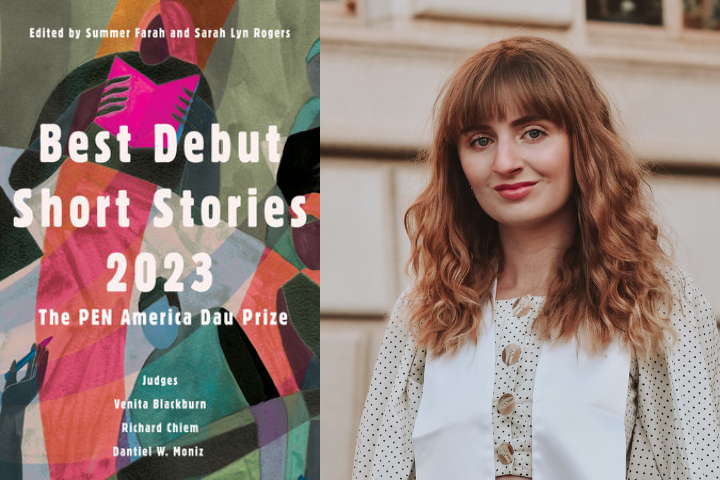Clara Mundy | 2023 PEN/Robert J. Dau Prize Winner

In the coming weeks, we will feature Q&As with the contributors to this year’s Best Debut Short Stories anthology, published by Catapult. These stories were selected for the 2023 PEN/Robert J. Dau Short Story Prize for Emerging Writers by judges Venita Blackburn, Richard Chiem, and Dantiel W. Moniz.
Clara Mundy studied English, French, and creative writing at the University of Texas at Austin. Originally from a Texas cattle ranch, she has gathered inspiration for her stories from both her rural upbringing and her time spent living in France. Along with the PEN/Robert J. Dau Short Story Prize for Emerging Writers, “Schism in a Soul So Tender” received the 2021 Roy Crane Award for Outstanding Achievement in the Literary Arts.
“Schism in a Soul So Tender” was originally published in Apricity Magazine.
Here is an excerpt:
I peel the oranges, savoring the feel of their rind beneath my fingernails. The juices spilling down my hands are heaven—everything in this room, the sheets and the books and the wood furniture, is dry and stagnant and trapped in a fixed state. When I leave it, there will be no indication of the months it sheltered me. These oranges grew until my aunt or cousin or mother plucked them from the tree. They reveal layers, peel giving way to wrinkled slices giving way to stem. The slices cling to each other as I pull them apart, begging not to be separated from their brood. I swallow their liquid sunlight, pretending it’s enough to ease my withdrawals.
Can you tell me a bit about the rituals of the world this story takes place in and how it’s connected to the rupture of the self? In this case, young women are experiencing a very literal separation within their person. How do you feel it relates to the world you and I are living in?
My story’s protagonist, Susan, lives in a world that villainizes women’s sexuality to such an extent that this aspect of themselves has separated from their physical bodies. This process has occurred for generations, leading to a new rite of passage for girls entering womanhood—rather than embracing and exploring their burgeoning sexuality, they must kill it, destroying that which threatens the established patriarchal order.
There are many ways in which this idea relates to our world—I’m thinking especially of abortion bans across the country, including my home state of Texas. But even before the recent attacks against reproductive rights, I grew up in a highly religious, mostly conservative community. Women’s sexuality was hardly discussed and only deemed tolerable in the context of marriage. When I began coming into my own, discovering the reality of my desires, it felt as if a strange creature had been exhumed when I wasn’t looking. I didn’t know how to reconcile my self-image with this new voice. And I don’t think my experience is unique.
What inspired you to write this story? Where did the idea come from?
The first paragraph came to me as a whole, and I sat with it for several days as I constructed the rest of the story. The setting evoked by the opening lines reminded me of the cattle farm on which I was raised, so I pulled from the simultaneous connection to nature and isolation from wider society that came from that upbringing. Susan’s journey then grew from me considering the values I had grown up around, particularly regarding women’s sexuality. I liked the idea of personifying that oft-neglected passion, of making physical the self-abandonment that patriarchal values push girls to accept generation after generation.
What do you hope readers take away from your story?
I hope they throw their own upbringings into relief—that they wonder what they might have lost in conforming to the expectations of their families or communities. I hope that readers also consider the subtle ways that power can seep into a person’s life and manipulate their self-image: What parts of ourselves did we only feel ashamed of after someone else told us we should?
How has the PEN/Robert J. Dau Prize affected you?
Writing is such a solitary act, so it’s been incredible to receive this recognition and begin connecting with other people in the publishing space. When I heard I had won the PEN/Dau Prize, I was living very far away from the people I love, feeling very unsure about how I wanted to proceed in life. Your typical post-grad malaise. Receiving this prize renewed my faith in my writing practice and my conviction that I have stories to tell that people are eager to hear.
What advice would you share with aspiring writers?
Find the writers whose work makes it impossible for you not to write as well: Writers who touch on themes that fascinate you, who construct sentences in ways you never thought of. In an essay on Kafka, Jorge Luis Borges said every writer creates his own precursors. While not every book I read informs my writing, I hold onto the books and authors who have shaped my ideas so that I can continue drawing insights from them. So far, this list has included juggernauts like Toni Morrison, Joan Didion, William Faulkner, and Sylvia Plath, as well as current writers like Elena Ferrante, Carmen Maria Machado, Agustina Bazterrica, Jeffrey Eugenides, and Fernanda Melchor. Reading their stories is a constant battle between turning the page and picking up my own notebook, which I love.






